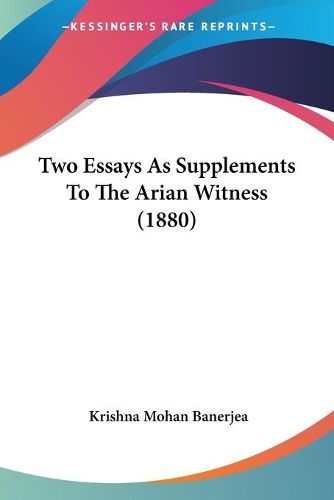Readings Newsletter
Become a Readings Member to make your shopping experience even easier.
Sign in or sign up for free!
You’re not far away from qualifying for FREE standard shipping within Australia
You’ve qualified for FREE standard shipping within Australia
The cart is loading…






Purchase of this book includes free trial access to www.million-books.com where you can read more than a million books for free. This is an OCR edition with typos. Excerpt from book: ed Assura-gurus, it was doubtless as an honourable human distinction conferred on their sons or disciples, because of their descent from Varuna, the all knowing Asura. And this leads us to enquire into the personality of the sons of Bhrigu, the son of Varuna, the Highest of Asuras. The most prominent person that claims our attention here is Kavi. The name itself is exceedingly remarkable. The universal application of the term in our days to a poet or learned man, is probably owing to the person whom it denoted in the age we are speaking of, viz. Kavir-Bhargava. He appears not only as the author of numerous Hymns in the Rigveda, but as the progenitor of a highly distinguished tribe, which did honor to the epithet of Asura, accorded to their primitive ancestor Varuna. The popular lexicons themselves have perpetuated his name as an Asura-guru, i. e., father or preceptor of Asuras. His sons enjoy equal celebrity in the Vedas. We have a Kavya, or son of Kavi, as an author of Vedic Hymns. We have an Usana, a son of Kavi, also a great writer of Hymns, and not only playing an important part in the drama of the Eigveda, but also honoured in later ages as an Asura-guru of the highest position by all Indian authorities. Of another branch sprung from Bhrigu, we have a Vena, recognized as an Asura in the Veda itself, and himself the father of a new tribe. He seems from his name and the description of his handsome bright appearance to have been the regent of the Planet Venus – usually called Suk (Sukra) in Indian records. We have also a Venya, son of Vena, noticed in the Eigveda. We have an Ita, a son of Bhrigu, who wrote (or uttered) a Hymn of the Eigveda. We have a Nema, also an utterer of Vedic Hymns, noted as a son of Bhrigu. We have again a Kava who appears perhaps under …
$9.00 standard shipping within Australia
FREE standard shipping within Australia for orders over $100.00
Express & International shipping calculated at checkout
Purchase of this book includes free trial access to www.million-books.com where you can read more than a million books for free. This is an OCR edition with typos. Excerpt from book: ed Assura-gurus, it was doubtless as an honourable human distinction conferred on their sons or disciples, because of their descent from Varuna, the all knowing Asura. And this leads us to enquire into the personality of the sons of Bhrigu, the son of Varuna, the Highest of Asuras. The most prominent person that claims our attention here is Kavi. The name itself is exceedingly remarkable. The universal application of the term in our days to a poet or learned man, is probably owing to the person whom it denoted in the age we are speaking of, viz. Kavir-Bhargava. He appears not only as the author of numerous Hymns in the Rigveda, but as the progenitor of a highly distinguished tribe, which did honor to the epithet of Asura, accorded to their primitive ancestor Varuna. The popular lexicons themselves have perpetuated his name as an Asura-guru, i. e., father or preceptor of Asuras. His sons enjoy equal celebrity in the Vedas. We have a Kavya, or son of Kavi, as an author of Vedic Hymns. We have an Usana, a son of Kavi, also a great writer of Hymns, and not only playing an important part in the drama of the Eigveda, but also honoured in later ages as an Asura-guru of the highest position by all Indian authorities. Of another branch sprung from Bhrigu, we have a Vena, recognized as an Asura in the Veda itself, and himself the father of a new tribe. He seems from his name and the description of his handsome bright appearance to have been the regent of the Planet Venus – usually called Suk (Sukra) in Indian records. We have also a Venya, son of Vena, noticed in the Eigveda. We have an Ita, a son of Bhrigu, who wrote (or uttered) a Hymn of the Eigveda. We have a Nema, also an utterer of Vedic Hymns, noted as a son of Bhrigu. We have again a Kava who appears perhaps under …